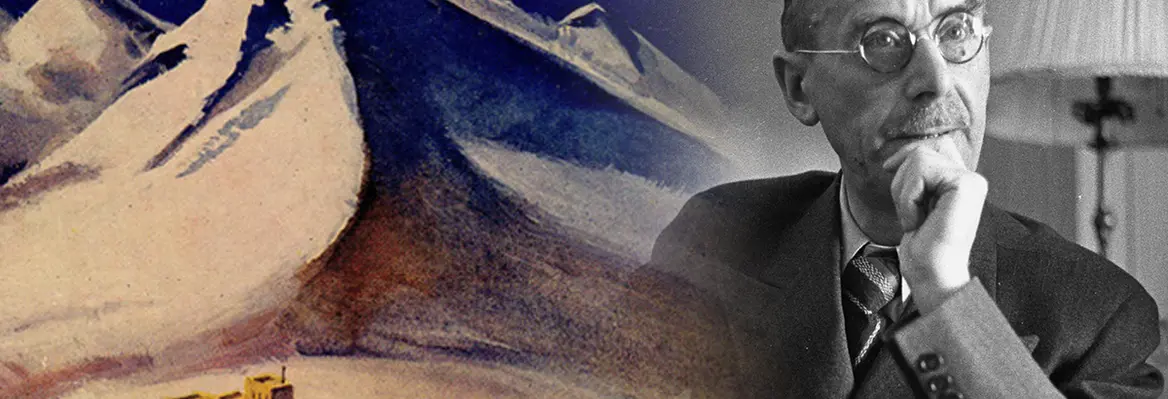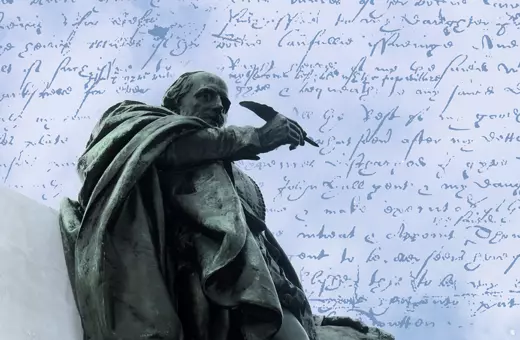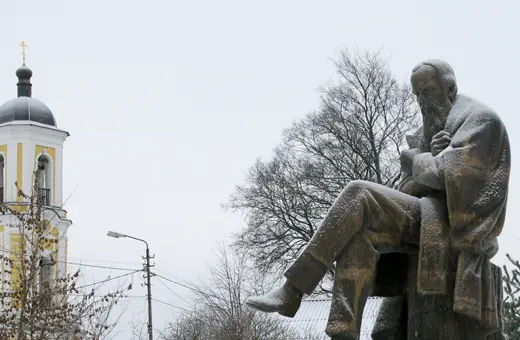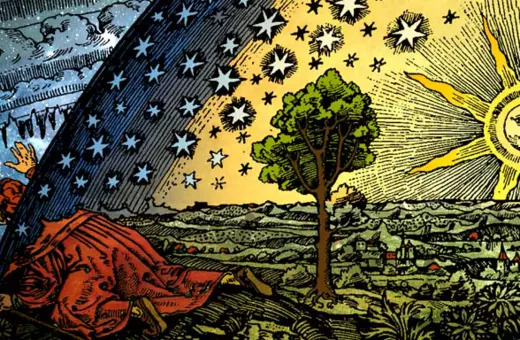Over three decades ago, Francis Fukuyama famously announced “the end of history,” declaring Western liberal democracy the final form of human government. But liberalism has failed to spread to the East and is now under threat in the West. In this article, contributing editor Oliver Adelson turns to Thomas Mann’s The Magic Mountain, arguing that its explosive philosophical battles anticipated the current crisis of liberalism and what might come next.
After the First World War, Bertrand Russell became convinced of the need for international governance and sought to establish a “League for Peace and Freedom.” Russell’s protégé Ludwig Wittgenstein purportedly rebuked him so severely for the proposal that Russell snapped, “I suppose you would rather establish a League for War and Slavery.” Wittgenstein’s reply: “Yes, rather that, rather that.”
At the center of Thomas Mann’s The Magic Mountain is such a collision of liberalism and its reactionary holdouts. Sequestered in a sanatorium in Davos, the novel’s protagonist Hans Castorp initially makes his ascent to the Swiss Alps for a three-week visit to his cousin. Days turn to weeks, months, even years, giving Castorp the chance to witness the duel—first intellectual, then deadly—between the Italian liberal humanist Lodovico Settembrini and the reactionary Jew-turned-Jesuit Leo Naphta.
Like so many of our era’s liberals, Settembrini has unbounded faith in the power of reason. “Humanity has sprung from the depths of fear, darkness, and hatred,” he explains to Castorp, but this fallen condition is only temporary. “The powers of reason and enlightenment will in the end set humanity wholly free.” To hasten mankind’s liberation, he joins the League for the Organization of Progress and contributes to its encyclopedia, The Sociology of Suffering, whose goal is nothing less than the abolition of all suffering on earth.
Settembrini’s adversary, Naphta, has a pedagogic itch and cannot resist sparring for influence over the impressionable Hans Castorp. Naphta scorns Settembrini’s religion of reason, which he argues has simply replaced God with Science and Progress. Settembrini’s international law for international governance is declared nothing but a secularized jus divinum. His individualism is dismissed as a pale imitation of the Christian doctrine that each person is created in God’s image. And his méliorism is brushed aside as a copy of Christian salvation after the Fall.
As for his positive proposals, Naphta supports the establishment of a Marxist world order which will assert the ideals of Augustine’s City of God by offering an alternative to the “decadent standards of the capitalistic bourgeoisie.” The Enlightenment—which turned individual reason into a universal solvent for existing forms of tradition, hierarchy, and community—went quite too far for Naphta. “Liberation and development of the individual… are not what our age demands,” he declares. “What it needs, what it wrestles after, what it will create—is terror.”
___
One century later, the same themes are playing out. Not least in Davos.
___
The clash of ideologies plays out over hundreds of pages before reaching its bloody climax. The violent rupture between Naphta and Settembrini marks the end of the sanatorium’s spell on Hans Castorp. Soon thereafter, the insulation from the outside world dissolves—Franz Ferdinand is assassinated and Castorp descends the mountain to fight in the First World War.
In the afterword to The Magic Mountain, Mann wrote that he sought to present “the inner significance of an epoch, the pre-war period of European history.” It would now be more accurate to say that his novel captured the inner significance of all modern epochs. One century later, the same themes are playing out. Not least in Davos.
Today, Settembrini’s ghost is quite at home in the Swiss Alps. Since 1971, the World Economic Forum (WEF) has convened politicians and global business leaders in The Magic Mountain’s very same Davos each year with the mission of “striv[ing] for a better world, where cooperation and trust lead to lasting progress.” The Forum has an uncanny resemblance to Settembrini’s League for the Organization of Progress, and like Settembrini, the Forum has long been convinced that the triumph of liberalism wasn’t a matter of if but when.
___
Technocratic cures to the convulsions of liberal democracy miss the mark. If this is all the doctors at Davos have to offer, the patient will be sick for a long time indeed.
___
In recent years, however, news of a populist backlash against liberal democracy has made its way to Davos. A 2017 WEF report declared a new crisis of democracy in the West, a “pivotal moment in political history” requiring “courageous new thinking.” What was the prescribed cure? After a long denunciation of referendum voting for introducing too much direct democracy, the WEF proposed “better use of technology in the process of government … a ‘digital public square’ with more direct communication between leaders and people.” Essentially, a proposal for more interactions between Trump and American voters on Twitter.
Technocratic cures to the convulsions of liberal democracy miss the mark. If this is all the doctors at Davos have to offer, the patient will be sick for a long time indeed. What we are witnessing in the West is the rise of illiberal democracy as a response to undemocratic liberalism. The Trumps, Le Pens, and Weidels of the world get their strength from the failings of the world’s Clintons, Macrons, and Merkels. And the reverse holds true as well. For liberalism in the West to triumph, it will need to offer something more substantial than technocratic proposals to the increasing number of Westerners seduced by illiberal populist rhetoric.
With liberalism languishing in the West, is there any more hope in the East? Settembrini was certain that the Enlightenment and liberalism were destined to encompass the globe. The spirit of 1789 would sweep east and provide a corrective to “the Asiastic principle of bondage and obduracy.” And for a while it looked like his prophecy would be fulfilled. In 1989, exactly two centuries after the upheaval of the French ancien régime and the implementation of bourgeois democracy in France, liberalism defeated communism, its only remaining world competitor. Francis Fukuyama announced “the end of history”—liberalism was the only viable ideology on the table.
But today Naphta’s prophecies appear more prescient. Liberalism in Russia, whenever it has managed to take hold, has been uprooted in a matter of years. The 1905 October Manifesto transformed the country into a constitutional monarchy, and following the 1917 February Revolution, the liberal Georgy Lvov was at the helm of the Provisional Government. But by October that year, the Bolsheviks had seized power and delivered a decisive blow to liberalism. Notwithstanding the brief interlude of liberalization under Gorbachev and Yeltsin, Russia has since held out and refused to assimilate to the Western model of liberal democracy. Each passing year, Putin consolidates power and strengthens his ties with the Russian Orthodox Church.
___
Dugin is simply taking a page from Naphta’s playbook.
___
Putin’s court philosopher, Aleksandr Dugin, in his long diatribes against liberalism, often reads like a latter-day Naphta. For Dugin, the universalist pretenses of liberalism are being dismantled by a relativistic and particularistic ethnopluralism. Drawing on postmodern critiques of the Enlightenment, Dugin argues that the modern individual can no longer claim to represent universal reason and justice, and must instead recognize the constraints of his particular perspective of reality. Here Dugin is simply taking a page from Naphta’s playbook. Toward the end of Mann’s novel, when Settembrini invokes universal justice in their final dispute before the duel, Naphta punctures his inflated ideal: “One was ‘just’ according to one standard or according to the other. All the rest was liberalism—in which nobody nowadays took stock.”
It is not just Russia which has held out. For all the talk in the West of liberalizing Islam, Muslim governments appear remarkably uninterested in liberal democracy. In The Magic Mountain, Settembrini prophesizes the creation of a secular, constitutional state in Turkey. Naphta scoffs, “Liberalization of Islam! Capital.” Today, one century later, as Erdogan steers Turkey further and further away from liberal government, can anyone deny Naphta’s derision has been vindicated?
If the trend continues—if liberalism fails to spread to the East and collapses in on itself in the West—what will be its successor? It is possible we could see a reversion to the fascist alternatives of the twentieth century. Fukuyama declared such ideologies to be defeated in the long run, but the crackdowns on American universities and the rise of völkisch rhetoric in Germany should make such declarations seem premature. Alternatively, we might see the proliferation of more modern forms of authoritarian government, the “new Leviathans” of philosopher John Gray. Which is worse for liberals? The answer can only be a Leninist one: They are both worse.






















Join the conversation